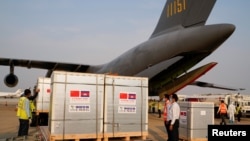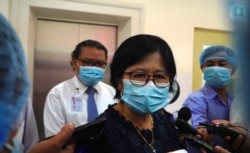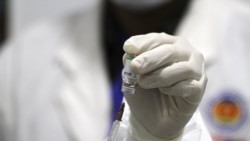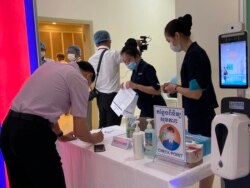Pich Samreth is a security guard working at a private company nearby the Phnom Penh International Airport. Last week, he was watching a breaking news broadcast of the arrival of Chinese-made vaccines on his mobile phone.
Pich Samreth, 54, said he was hesitant to get vaccinated but would do it only if the government made it mandatory.
“My life is important because my family depends on me," he said, “But, if our leaders get vaccinated first, and they are fine, maybe I could follow them.”
Pich Samreth’s apprehension over the first batch of Sinopharm vaccines was shared by other Phnom Penh residents, which was being used to vaccinate priority groups starting Wednesday.
In January, Hun Sen said he accepted Sinopharm vaccines because Cambodia could not wait longer to start inoculations – an about-turn from his earlier decision to only accept vaccines recognized by the World Health Organization.
The government has encouraged senior government officials, including members of the prime minister’s family and the Cambodian People’s Party leadership. But, the public has been skeptical of the effectiveness of the Sinopharm vaccine.
After volunteering to be the first to get the vaccine, Hun Sen backtracked after Chinese doctors said only people within the age bracket of 18 to 59 years should get vaccinated, disqualifying Cambodian seniors from getting the shot.
Then Or Vandine, a Health Ministry secretary of state, held a press conference on Monday giving a long list of pre-existing conditions and health conditions that would exclude people from getting inoculated.
The reversals and lack of clear information have made Phnom Penh residents weary of the only vaccine on offer in the country for now. Cambodia will get vaccines from the COVAX Facility, which will be the AstraZeneca candidate from India’s Serum Institute of India. The government has said it was open to buying additional vaccines from other pharmaceutical companies.
Bun Sovanrith, a 30-year-old tuk-tuk driver, said he would only be vaccinated with shots approved by the World Health Organization. He said the country wasn’t in an emergency that it needed to desperately get vaccines before they were approved by the WHO.
"I have no plan to get vaccinated,” he said, referring to the Sinopharm vaccine. “The vaccine is not yet recognized by WHO, so I don’t trust it yet."
He would be willing to spend his own money to get the vaccine as long as it was approved by the WHO.
Or Vandine said that Cambodia had carefully considered the pros and cons of the vaccine before approving the emergency use of the Sinopharm COVID-19 vaccine last week. The vaccine is around 79 percent effective, according to the manufacturers of Sinopharm.
"Our decision is not compromised," she told journalists after she got vaccinated on Wednesday.
"Why do I dare to get vaccinated? Because I have already studied the vaccine,” she said, adding that the vaccine had been developed ‘thoroughly’.
Or Vandine did not provide an answer when VOA reporters asked if Cambodia had obtained data and analysis from the vaccine’s Phase 3 trials and if this information would be made public.
The WHO’s Cambodia office did not respond to the request for comment. The global health body has not provided any comments on the use of the Sinopharm vaccine or Cambodia’s decision to accept the shots from China.
The Pasteur Institute in Cambodia, which is in charge of testing for COVID-19, said they were not part of the vaccination drive started by the government.
“There was no need to consult IPC as we are not part of the vaccine initiative but we concentrate on diagnostic (PCR testing) and research activities not related to vaccine operational response,” said Laurence Baril, who heads the laboratory.
Dr. Chhea Chhorvann, the head of the National Institute of Public Health, said his team was part of the country’s COVID-19 response and had conducted training at the Health Ministry, but “played a few roles” in the vaccine rollout.
“Technically, although we do not have [information about] specific side effects for the vaccine, we know the general side effects of a vaccine because most vaccines are developed based on the same principle,” he said.
While apprehension over the COVID-19 vaccine has persisted, despite the government public relations attempts, some Phnom Penh residents weren’t averse to taking the two-shot vaccine.
Ton Ravuth, 30, a mineral water vendor, said he had no hesitation taking the Sinopharm vaccine, adding that the fear of getting the disease outweighed any concerns over the vaccine’s effectiveness.
“I am scared of the coronavirus disease as it cannot be seen with my eyes. The vaccine could reduce the spread of this disease,” he said.
Others were hoping the vaccine, whether effective or not, would return the country to some form of normalcy and economic stability.
Yim Virak, a street vendor, wanted his economic situation to improve and feel safe there were no health risks from COVID-19.
“2020 was a disaster year for everyone, myself included, where we faced difficulties in life. I wish 2021 a better year,” he said.







